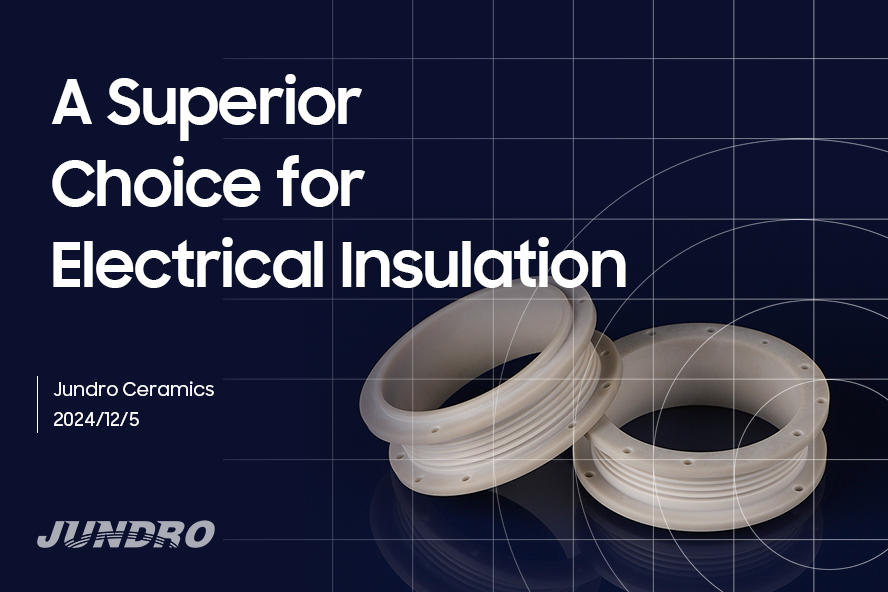
Aluminum nitride (AlN) ceramics are gaining significant attention in industries requiring advanced electrical insulation materials. Their unique combination of high thermal conductivity, excellent electrical resistivity, and robust mechanical properties positions them as a preferred choice for applications where performance and reliability are critical.
Aluminum nitride is a non-oxide ceramic material with a crystalline wurtzite structure. Unlike traditional electrical insulators such as alumina or glass, AlN offers a rare balance of thermal and electrical properties. With a thermal conductivity exceeding 170 W/m·K, it efficiently dissipates heat, a critical feature in high-power electronic devices. Simultaneously, its high electrical resistivity, typically greater than 10¹³ Ω·cm at room temperature, ensures effective electrical insulation even under demanding operating conditions.
The advantages of AlN ceramics go beyond basic insulation. Here’s what sets them apart:
Superior Heat Dissipation: In high-density circuits or power modules, managing heat is as important as insulating against electricity. Aluminum nitride’s thermal conductivity is an order of magnitude higher than most traditional insulating materials, making it ideal for thermally demanding applications.
Electrical Stability: The material’s high dielectric strength and resistivity ensure reliable insulation, even in high-voltage environments. This makes it suitable for critical applications like power electronics and aeospace systems.
Chemical and Mechanical Robustness: AlN ceramics are resistant to most chemical attacks and exhibit excellent mechanical strength, which enhances their lifespan in harsh environments.
Low Thermal Expansion: The low coefficient of thermal expansion (CTE) closely matches that of silicon, making AlN a perfect substrate for semiconductor applications.
The unique properties of aluminum nitride make it indispensable in several advanced fields:
Power Electronics: AlN is widely used as a substrate material for insulated gate bipolar transistors (IGBTs) and other high-power modules. Its ability to combine electrical insulation with thermal conductivity ensures efficient operation and enhanced durability.
LED Technology: The material serves as a thermal management solution in LED packages, helping to maintain brightness and extend operational life by effectively dissipating heat.
Semiconductor Industry: AlN substrates are used in the fabrication of high-frequency and high-power devices due to their electrical stability and compatibility with silicon.
Aerospace and Defense: In systems where reliability is paramount, such as satellite components and radar systems, AlN’s insulating and thermal properties ensure stable performance under extreme conditions.
In the realm of electrical insulation, traditional materials like alumina and beryllia are often considered. However, aluminum nitride outperforms them in key aspects:
Thermal Conductivity: While alumina has a thermal conductivity of about 20–30 W/m·K, aluminum nitride exceeds 170 W/m·K, making it far superior for heat dissipation.
Electrical Insulation: AlN offers higher resistivity compared to most ceramic insulators, ensuring better performance in high-voltage systems.
Safety and Environmental Concerns: Unlike beryllia, which poses health risks during processing, AlN is non-toxic and safer to handle.
Despite its remarkable properties, aluminum nitride does come with challenges. The material’s processing requires high temperatures and controlled atmospheres, making it more expensive than traditional ceramics. Additionally, its brittleness necessitates careful handling and precise machining techniques, especially for complex geometries.
As industries demand higher efficiency and reliability, the use of aluminum nitride ceramics is set to grow. Innovations in manufacturing techniques are expected to lower production costs, making AlN more accessible for widespread adoption. Its role in emerging technologies like electric vehicles, renewable energy systems, and next-generation communication devices further highlights its potential.
Aluminum nitride ceramics offer a rare and invaluable combination of properties that make them ideal for electrical insulation applications in modern technologies. By addressing challenges in processing and cost, AlN is poised to revolutionize industries that rely on efficient, reliable, and high-performance insulating materials. For engineers and researchers, exploring the capabilities of AlN ceramics could open doors to groundbreaking advancements in electronics and beyond.
Dongguan Jundro ceramics Technology Co.,Ltd
E-mail:info@jundro.com
Tel:+86-769-82913501
Fax:+86-769-82913801
Add: Room 306, Gate B, Unit 1, Block 2 South, No. 1 Yile Road, Songshan Lake, Dongguan City, Guangdong Province, China(523808)
© August Dongguan Jundro ceramics Technology Co.,Ltd- 2023